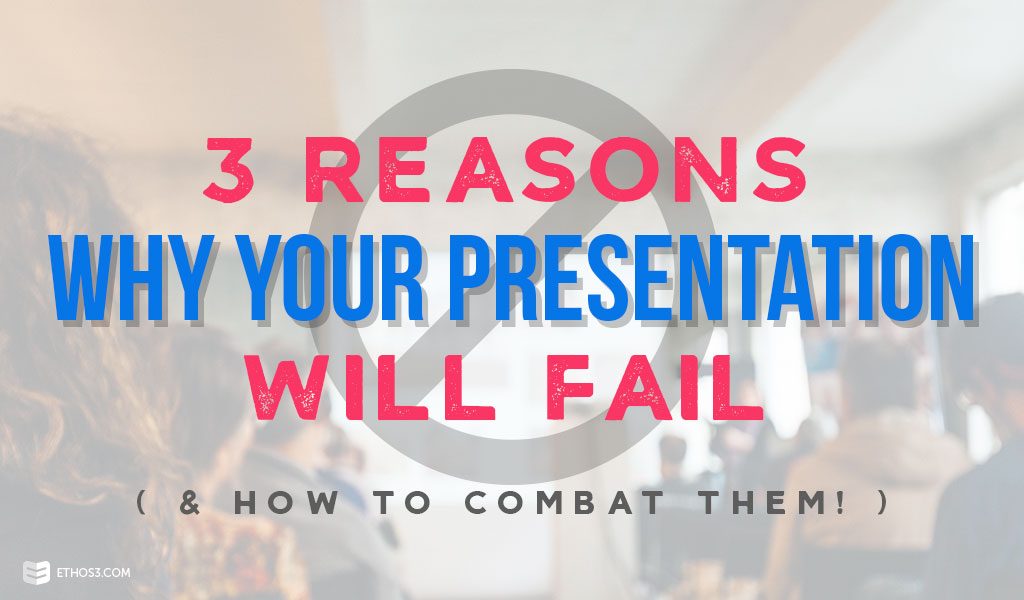Presentations can lead to life changing moments for startup businesses and budding thought leaders. With the right amount of practice, strategy and stamina, PowerPoints can go from okay to exceptional. With every presentation, there are obstacles that can cause your performance to fail. It’s easy to fall into these traps and hurt your potential success. There are many factors that can cause a presentation to fail, in this article we will cover the top three.

Winging It
Rehearsing your presentation is a must. Get the best results from your hard work with the right amount of practice. ABC News did a study on how to improve your public speaking skills. One expert says that you should allow one week to practice your presentation before you perform in front of an audience. “You’re not going to get it until you stand up and say it out loud and time it, maybe in front of a room full of people,” says communications researcher Maegan Stephens. “We know from research that the delivery needs to be really polished for the content to ring true.”
Your presentation will fail if you attempt to memorize your PowerPoint the night before your presentation. This will only cause unneeded stress that will make the presentation less impactful. Stress can lead to the wrong body language and physical symptoms that will hurt your success. Don’t memorize notes either; this will make you sound rigid and unnatural. You want to sound conversational and relaxed. Instead of memorizing the presentation word by word, be the expert on your product or story. The more your natural passion can show while you speak, the more the audience will trust you.
No Engagement
Audience attention spans are short. Most audience members start to lose focus after 10 seconds of you speaking. Keeping the entire room engaged has to start once you open your mouth. Stephens says audiences will remember the very first thing you say and the very last thing you say. Everything in the middle is hit or miss. Within the first 15 seconds of you speaking, the audience will begin to form an impression of you. Make sure it’s the right one. “It hurts me when a speaker starts with, ‘Hi my name is … and I’m here to talk to you about ‘X,'” Stephens said. “You’re missing a key opportunity to get people on board when most likely someone already introduced you. Tell me something I don’t already know. Tell me something that makes me want to listen to you.”
Your presentation will fail if you can’t engage your audience right away. Begin your presentation with a surprising statistic, inspiring quote or compelling question. Keep your audience engaged by applying structure. Research shows structured presentations are 40% easier for an audience to remember. Build a strong introduction with smooth transitions from slide to slide. End the presentation with a call to action that will motivate your audience to follow through with your message.
Complex Messages
Presentations with slides of long bullet point lists are a huge no-no. This boring trend has lead to the “Death by PowerPoint” movement. Loading up your deck with text full of jargon and useless information will destroy your impact and messaging. Audiences will miss the most important messages if your try to overload them with information. Stanford Graduate School of Business lecturer Matt Abrahams tells ABC News, “Many presenters speak the way they write — that is, they use complex sentences with nested clauses and phrases. This works well in writing, but when you’re presenting, it’s hard for you to speak and challenging for your audience to follow.”
Your presentation will fail if you don’t simplify your content. The Ethos3 strategy is the Rule of Three’s. Each presentation should introduce three main takeaways that you want the audience to remember. Each takeaway can be explained with supporting points. Then, before you conclude your presentation, review those takeaways again. Repetition works in presentations because you want your audience to walk away remembering your main messages.
Failed presentation are caused by little practice, no engagement and complex messages. You can combat these obstacles by applying these presentation skills. If you are ready to elevate your presentation training and skills, take advantage of our Empowered Presenter package. This deal includes all the tips and tricks you need to know to win over your audience every time. Don’t let your PowerPoint become a boring failure. Raise the bar by applying jumping over these presentation obstacles.
More posts from the Ethos3 Blog: